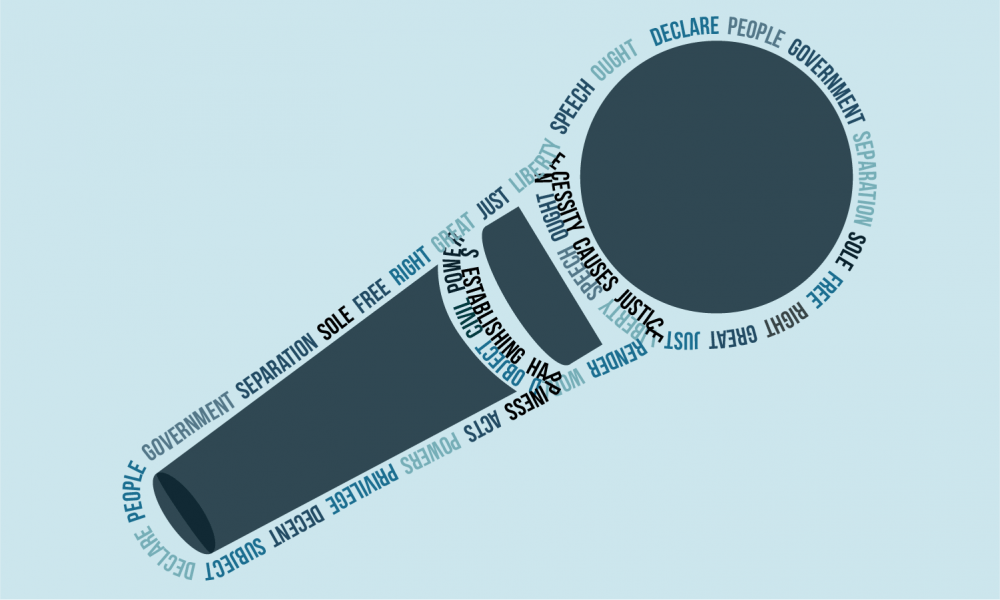
With the rise of social media and growing numbers of national protests, hotly contested debates over free speech in the context of religion, politics, privilege, and race have played out online and on the streets. This year saw free speech dominating headlines nationally as well as on Penn's campus. As the year comes to a close, here is a look back at what issues drove the free speech debate in 2017.
Donald Trump's election put free speech into focus on a national stage
Following Trump's inauguration, millions of protesters, including some Penn students, donned vibrant pink hats and flooded the streets of Washington in January's “Women’s March on Washington,” speaking out in fiery protest against the incoming president and his history with alleged sexual misconduct. Mirror protests cropped up in Philadelphia and other major cities.
In the following August, thousands of white nationalists and activists associated with the "alt-right" movement converged in Charlottesville, Va. for a rally that left three people dead. Trump drew heated criticism after the rally for suggesting that the counter-protesters deserved as much blame for the violence as the neo-Nazis and white supremacists who organized the rally.
Trump, a 1968 Wharton graduate, clashed next with NFL players who, following the lead of quarterback Colin Kaepernick, kneeled during the national anthem in silent protest of police brutality and the plight of black Americans. Trump said the protesting players should be fired while Vice President Mike Pence made the news for leaving an Indianapolis Colts game after some players knelt during the anthem.
At college campuses like Penn's, the line between hate and free speech blurred
At Penn in mid-April, neo-Nazi recruitment flyers with messages like "Stop the blacks" and "Join your local Nazis" were displayed across campus.
In response, Penn President Amy Gutmann and former Penn Provost Vincent Price declared that "hatred and fear-mongering have no place at Penn," in a University-wide email.
In the days after the neo-Nazi material first appeared, students took public space into their own hands, covering the LOVE statue near College Green with posters depicting a figure throwing a swastika in the garbage. The image sported the caption, "Anti-Fascist Zone."
Following multiple appearances in 2016, a group of anti-LGBTQ preachers continued to visit Penn and other local colleges multiple times this year. Armed with explicit banners, the group chanted jeers against “homo-sex,” Jews, Muslims, and women. Many of their appearances were met with organized resistance from LGBTQ-identifying students, and faculty members such as University Chaplain Chaz Howard, who called the preachers' messages “terribly hateful" and "extraordinarily mean-spirited.”

While many students called for the preachers to be ejected from campus on the grounds of spreading hate speech, the University could not bar them from protesting outside of Van Pelt Library since Locust Walk and College Green are public spaces. In January, though, a Penn maintenance worker told The Daily Pennsylvanian he was instructed to drown out the protesters by driving a loud leaf blower in front of them. A University spokesperson denied this claim.
College Green has been the location for other student demonstrations, as well. In mid-September, freshman students held a rally to stand in solidarity with beneficiaries of the Deferred Action for Childhood Arrivals program, which Trump has said he will end. A month later, Quakers for Life, a Penn student group opposed to abortion, invited a national pro-life organization to display nearly 20 graphic pictures of aborted fetuses outside of Van Pelt, prompting backlash from gender advocacy groups like the Penn Association for Gender Equity.
Not all of Penn’s most contentious displays of free speech happened in public spaces
The months-long controversy surrounding Penn Law professor Amy Wax began with an op-ed, published without much notice in The Philadelphia Inquirer on Thursday, Aug. 9. That piece, entitled "Paying the price for breakdown of the country's bourgeois culture," was co-authored by Wax and quickly became a source of widespread debate on campus and beyond.

Wax and her co-author, University of San Diego School of Law professor Larry Alexander, said America's success depends on "the hegemony of the bourgeois culture" — a claim 33 of her Penn Law colleagues said they "categorically reject" in a DP op-ed published on Aug. 30. Wax, who has said that "bourgeois values" could apply as easily to nonwhite people as to white people, drew fierce condemnation for telling the DP in an interview on Aug. 10, "Everyone wants to go to countries ruled by white Europeans."
Shortly after the uproar over Wax's column, Penn's chapter of the conservative Federalist Society invited her to speak at the law school in October, where she decried her colleagues as the "Gang of 33."
“One does have the right to hurl crude words like yuck, ick, xenophobe, hater, and of course, the ubiquitous, accusatory 'racist,'” she said. “But that doesn’t make it the right thing to do or the right way to go about academic discourse.”
The Daily Pennsylvanian is an independent, student-run newspaper. Please consider making a donation to support the coverage that shapes the University. Your generosity ensures a future of strong journalism at Penn.
Donate







